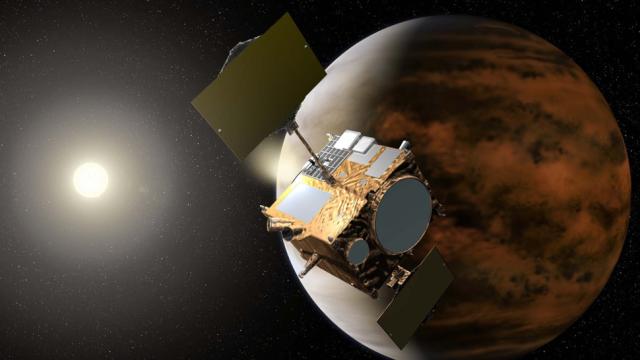Following an unexpected energy surge, Japan’s space agency has hit the pause button on two of the five cameras aboard its Venus-orbiting Akatsuki spacecraft. It’s a bad sign for the troubled orbiter, which has been exposed to more radiation than anticipated.
Image: JAXA
Back in December, an electronic device that controls the two cameras started to consume an excessive amount of power, making it impossible for mission planners to control the instruments. After weeks of trying to fix the glitch, and with no success, the mission planners have decided to shut down the two cameras, dubbed IR1 and IR2. JAXA will periodically try to restart the cameras in the hopes that the problem somehow goes away, but it doesn’t look good.
The problem, says JAXA, is the likely deterioration of electronic parts caused by excessive exposure to radiation. Back in 2010, the orbiter failed to hit its mark when approaching Venus, resulting in an unplanned five-year journey around the Sun. On December 7, 2015, Akatsuki finally reached its destination, entering into an alternative elliptical orbit. The probe began its investigation of Venus’ atmosphere in April 2016, and things have gone fairly smoothly since then.
It now appears, however, that this earlier episode — and the probe’s close brush with the Sun — exposed Akatsuki to higher levels of radiation than anticipated, causing the deterioration of its instruments.

A vortex in the Venusian clouds. Although similar vortices are seen in our planet’s atmosphere, it’s the first time such a feature was spotted on Venus. (Image: JAXA)
The two cameras affected, IR1 and IR2, were being used to image heat radiation from the rocks on Venus’ surface and from the lower reaches of the atmosphere. The three remaining cameras are still operational, allowing the mission controllers to scan the planet in normal light, ultraviolet, and longwave infrared. The mission is continuing as planned, but there’s concern that other instruments may start to fail as well.
The probe — designed for four-and-a-half years of work — is starting to show signs of deterioration after just one year orbiting its intended target.
This really sucks because Akatsuki has been doing some rather amazing science. Last year, the IR2 camera spotted a vortex in the Venusian clouds, confounding researchers. These features aren’t supposed to happen in an atmosphere dominated by “super rotation,” where winds howl at 362km-per-hour.
[referenced url=”https://gizmodo.com.au/2017/01/an-enormous-atmospheric-anomaly-has-been-spotted-on-venus/” thumb=”https://i.kinja-img.com/gawker-media/image/upload/t_ku-large/s1xntilgfdekfqzuyd0v.jpg” title=”An Enormous Atmospheric Anomaly Has Been Spotted On Venus” excerpt=”Using the Akatsuki spacecraft, Japanese scientists have detected a large, bow-shaped anomaly in the upper atmosphere of Venus. Strangely, the 10,000km-long structure is refusing to budge despite the 359km/h winds that surround it.”]
In another amazing discovery, the probe spotted a 9978km-long structure in the atmosphere that’s refusing to budge. JAXA scientists say it’s the largest “gravity wave” ever recorded in the solar system. As Akatsuki is showing, Venus is a very complicated place, and we’ve just barely scratched the surface in terms of understanding how it works.
Let’s hope this latest setback is an isolated incident, and Akatsuki continues to function properly for years to come. In the meantime, engineers on Earth need to figure out how to make our space-based instruments more resilient to the damaging effects of radiation. Thankfully, NASA is already working on the problem.
[JAXA]
